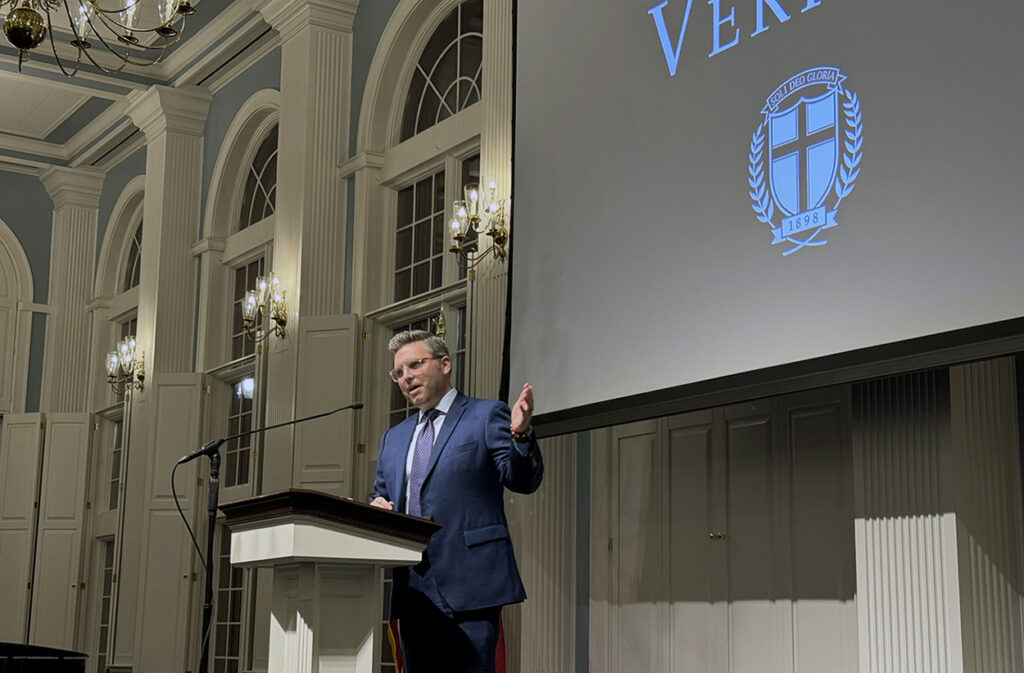
DALLAS (BP) – Christians can counter bitter and angry political division by returning to first principles and understanding proper categories, Brent Leatherwood told a gathering at Dallas Baptist University.
Leatherwood, president of the Southern Baptist Convention’s Ethics & Religious Liberty Commission, spoke Feb. 6 as part of the Veritas Lecture series, sponsored by the DBU Institute for Global Engagement.
“Do we have a political theology with the correct categories to capture and understand the ethical dilemmas we face?” he asked.
Too often, Christians – like others in the larger culture – simply react and respond to social media “curated by algorithms designed to provoke the worst reactions from us,” rather than thoughtfully considering foundational principles, he said.
“Are we Christian citizens or fearful followers?” Leatherwood asked.
While the Bible instructs Christians to fear God and be followers of Christ, it matters what provokes fear and who is being followed, he asserted.
“In our present day, we unfortunately have too many people afraid of the wrong thing and following the wrong person,” he said.
Appealing to selfish desires
Extremists on both the left and the right foster fear that appeals to selfish desires, Leatherwood said.
“When people are afraid, they look for anything that will make them secure. They look for power – power they can take for themselves or power they can hand to someone else who will fight on their behalf,” he said.
“They call for a strong man – an authoritarian who will wield the levers of the state in their favor. In the face of a perceived existential threat, they want to make sure that at least their group survives.”
Fear drives voters to cast ballots to protect themselves against perceived threats to the power they desperately want to hold onto, he observed.
“The end result is not a desire to build something good and to seek the welfare of the neighbors around us or even to leave something better. No, it’s just the desire to protect ourselves from ‘them,’ whoever ‘they’ may be at any given moment,” Leatherwood said. “It’s a mindset that says results – not character – is what matters.”
Fear makes the pursuit of power the highest objective, he noted.
“Fear-based thinking is not what we are called to as Christians,” Leatherwood said.
Religious convictions should shape how Christians engage politics, and political activity should flow from faith commitments, he added.
“Every time we enter the public square, whether that is the digital landscape on Facebook or a conversation with co-workers or heading to vote at the local precinct, we should be articulating and advocating for a conception of what we believe to be good, true, just and right,” he said.
Impact of Christian identity
Leatherwood offered two principles that should serve as the parameters for Christian political participation: “Our identity as Christian citizens is shaped by our identity as exiles. Our identity as Christian citizens is shaped by a proper understanding of the state.”
The Bible speaks of God’s people as “exiles” and “sojourners” who see their identity primarily as Christians, whose ultimate loyalty is to the kingdom of God and whose citizenship is in heaven, he said.
At the same time, Christians should follow God’s Word to the Old Testament prophet Jeremiah, instructing God’s people in Babylonian exile to put down roots and seek the peace and prosperity of the place where God brought them, he added.
God’s people are called to be “instruments for the well-being of their neighbors,” including those who do not share their faith, he asserted.
“We are not called to shallow civic participation but to deep and thoughtful investment. We are to be more than just values voters,” Leatherwood said.
He urged Christians to move beyond the idea their responsibility as citizens ends when they cast an occasional ballot or post a string of Tweets.
“If you are just in it for the clicks, let me assure you: True Christian citizenship will look like the kind of generational work that will often go unnoticed and be largely unremarkable,” Leatherwood said.
“Christian citizenship is characterized by loving our neighbors and our communities, because God loves the world.”
Leatherwood noted Jesus made clear a proper understanding of the state when he said, “Render unto Caesar the things that are Caesar’s and unto God the things that are God’s.”
‘Jesus is Lord’ as a political declaration
For Christians, he said, it begins with a call to remember their baptism and their declaration of faith in the lordship of Jesus.
“To declare that Jesus is Lord is to declare that Caesar is not. … To declare that Jesus is Lord is to declare that Joseph Biden, Donald Trump or whoever else may hold the office of president in January 2025 is not,” Leatherwood said.
Christians recognize the state holds proper authority to prevent evil and promote good, but it is limited and derived from God, he insisted.
Love for one’s country should motivate Christians to seek the good of all its people and to have a proper perspective about the relative importance of politics, he said.
“When we have a proper understanding of Christian citizenship, it will radically change the way we think about politics. In fact, it will cause us to actually deemphasize the importance of politics in our daily lives,” Leatherwood said.
“It serves as a guardrail to keep us from equating politics with religion – because for many, that is what politics has become.”
Rather than investing an undue amount of time and emotional energy on national politics, Christian citizens may be most effective when they focus on serving their local communities and seeking to improve the lives of their nearest neighbors, he suggested.
While Christians should not ignore justice or compromise their moral convictions, they should acknowledge the inherent dignity and worth of those who hold different political views.
“We recognize the individual across the aisle is either a brother or sister or a potential brother or sister,” he said. “We don’t get to declare a mulligan for the fruit of the Spirit. We don’t get to toss out the Sermon on the Mount because we have decided that Jesus’ words apply only to nice guys, and right now we need street fighters. …
“We stand ready to give a defense for the hope that is within us and to do so with gentleness and respect.”
This article originally appeared in the Baptist Standard.
















